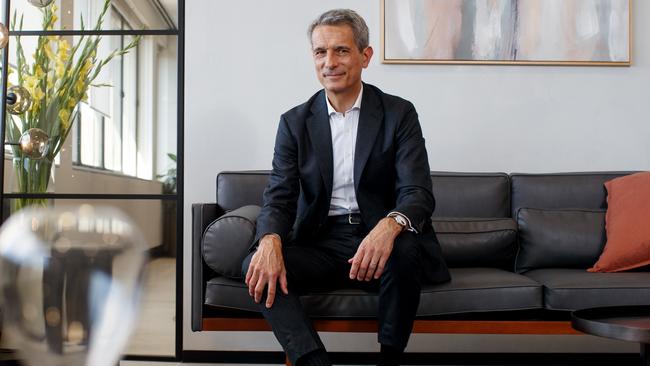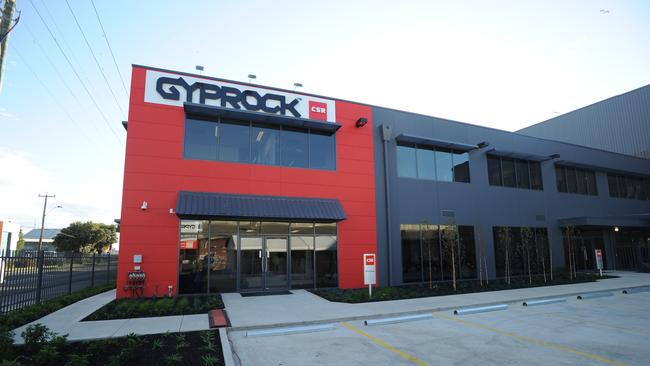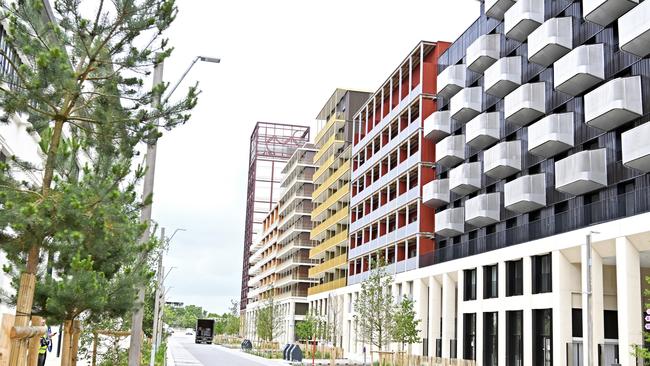Meet the French CEO on a mission to build more houses here
Benoit Bazin’s company might not have the cache of French names like Hermes or L’Oreal, but CSR’s new owner has a massive global impact on the humble home.

Benoit Bazin has a busy few weeks ahead of him.
As CEO of one of France’s biggest companies, he is hosting a string of events for building materials company Saint-Gobain during the Olympics in Paris.
As a Games sponsor, his company played a major role in building the cutting-edge athletes village in the city’s northeast, delivering materials such as plasterboard, glass and recycled insulation.
His company also built a designer skate park using never seen before 3D-printed concrete blocks in the office district of La Défense.
Bazin’s obsession with eliminating waste and carbon emissions from an industry that contributes its fair share of both saw Saint-Gobain use canals to help transport its products.
And in Sydney, another Olympic city on the other side of the world, Bazin has just taken charge of Australia’s CSR through a $4.5bn buyout that has been years in the making.
It is here where this Frenchman is determined to help deliver more and highly efficient houses.
This is the mission he has planned for CSR, better known for materials such as Gyprock, Monier roofing, Bradford insulation as well as floors and ceilings, and a company that itself has faced its own ups and downs over the past decade.
Bazin, who is in Sydney, has just taken control of the 170-year-old company after lobbing his blockbuster bid in late February.
Indeed, at $9 a share, the bid was so fully priced it won immediate backing of CSR’s board. It represented share price levels not seen since the Global Financial Crisis. Unlike other takeovers that have hit resistance, more than 98 per cent of CSR investors backed the deal, allowing the buyout to be wrapped up at lightening speed.
It was also part of a flurry of deals across Australian building materials players, with the Stokes-backed Seven Group buying out cement major Boral while Irish giant CRH has taken out Adelaide Brighton for $2.1bn.
At about €41bn ($66bn) Saint-Gobain ranks among France’s top 20 companies. There’s more than 160,000 employees across hundreds of manufacturing plants in nearly 80 countries.
It might not have the cache of French names such as LVMH, Hermes or L’Oreal, but it has massive global impact in building the humble home.
And then there is the history. Founded in the mid 1600s, a century before Napoleon was born, it is named after the Normandy town Saint-Gobain. It started out manufacturing mirrors in a bid to undercut the Venetians, who had a monopoly on the market at the time.
Keeping it local
But after spending his billions here, Bazin intends to take a uniquely hands-off approach to run CSR. Indeed, under Bazin’s leadership over the past six years, Saint-Gobain has expanded by bucking the trend of global businesses. He is unique in advocating a decentralised model in this case. CSR will be left with the existing management team. Current executive general manager Paul Dalton is stepping up as CEO. Outgoing CEO Julie Coates will serve on a new local board that will oversee the company that will still be known as CSR.
“We basically give the keys to all Saint-Gobain products and clients in any given country to a country CEO,” Bazin says.
“We have a Polish woman in Poland. We have a Mexican in Mexico. Ninety-plus per cent of our managers are native from their country. And this is why it’s very important for us to have Australian managers to run Australia for Australian customers.
“And on top of that, production is local, because our products don’t travel”.
The addition of CSR marks another step in the transformation of Saint-Gobain under Bazin.

When he started as CEO more than six years ago, 70 per cent of his sales came from Western Europe. But through sales of some business lines and expansion across Asia and South America, and especially in the US and Canada, the proportion is down to 40 per cent, while growing his overall revenue pie to more than €50bn.
This shift in revenue mix helped to insulate the worst of the shock during the early months of Russia’s invasion of Ukraine, when energy costs surged. While his business and customers in Europe were feeling the pinch, Saint-Gobain’s diversification gave it some protection. It may have been a different story if the 70 per cent figure remained.
It’s the age of the company that gives him a long-term perspective for CSR’s growth and here he is optimistic. This includes bringing some of Saint-Gobain’s massive balance sheet here, while rolling out more cutting-edge products and lessons from Europe in slashing carbon and energy intensity.
Housing crisis
For Bazin, the move into Australia represents a play on the long-term fundamentals of the housing market. CSR is everything about building a new home or renovations, the “building envelope”.
“We are looking at growth in the big countries where geopolitics is solid, currency is solid, and there is a good population growth, which for us is the main driver of construction.
Australia is facing a structural housing shortfall, which is being aggravated by robust immigration as the economy continues to grow. This means more homes need to be built, and both the federal and state governments are grappling with how to bring more homes to the market faster. Along with housing, there’s a need to build out social infrastructure, from schools to hospitals and other structures, to support population growth.
“Australia is a very attractive market,” Bazin says. “It’s true for the population. It’s true for construction. There is support from the government at various levels to deliver on the housing needs; It’s a growing construction market for us for years, if not decades.”
But for Bazin, the idea of building a house runs deeper than construction. Homes have a much bigger, and maybe underappreciated, role to play in cities.

Homes “are the crossroads today of several social topics”.
There’s the shortage issue; the pressures around affordability housing; and there’s also the environment.
Then there’s a massive amount of energy that goes into housing through either keeping homes cool or warm.
“In France, we spent 45 per cent of the energy in buildings, which is more than the nuclear plants produce,” Bazin says. “Within buildings, you can save a lot of energy. When we do a full renovation of a home in France, we can drop five to six times the amount of energy spent – and then you can free up energy and use it in areas like industry or mobility, where you need energy.
“And we should not underestimate the social impact it has for the wellbeing of society. So needs of housing are there”.
Bazin says Europe has started to turn a corner. Particularly after the disruption of Covid and the Russian-Ukraine war. He makes it a point of pride his energy-hungry glass plants kept running through the worst of the crisis, helping to keep the economy in respective countries going. Less known is that Saint-Gobain extended more than €2bn of cheap and interest-free loans to longstanding customers that were being financially crippled by the energy crisis.
“Europe is getting out of the woods,” he says, with interest rates and inflation dropping. Energy prices remain elevated, although have come off from their highs. This is forcing Saint-Gobain to double down on its efforts to deliver low-energy production.
He says the feeling back home on the streets of Paris is rapidly becoming more optimistic ahead of the Olympics. Sydney experienced the same euphoria in the lead-up to its Games.
“It is coming. You see places now ready, the Eiffel Tower, the Concorde square or the skate park, Parisians are getting ready in their minds,” he says.
“I think it should be good”.




To join the conversation, please log in. Don't have an account? Register
Join the conversation, you are commenting as Logout